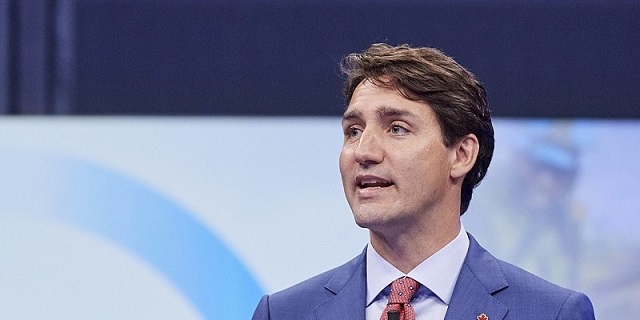Uncategorized
Man linked to Saudi prince at consulate when writer vanished

ISTANBUL — A member of Saudi Crown Prince Mohammed bin Salman’s entourage during several trips abroad walked into the Saudi Consulate in Istanbul just before writer Jamal Khashoggi vanished there, a surveillance photo leaked Thursday shows, drawing the kingdom’s heir-apparent closer to the columnist’s alleged slaying.
The man, identified by Turkish officials as Maher Abdulaziz Mutreb, has been photographed in the background of Prince Mohammed’s trips to the U.S., France and Spain this year.
Turkish officials say he flew into Istanbul on a private jet along with an “autopsy expert” Oct. 2 and left that night. That was the same day Khashoggi, a columnist for The Washington Post who wrote critically of Prince Mohammed’s rise to power, entered the consulate and was not seen again.
Saudi Arabia, which initially called the allegations “baseless,” has not responded to repeated requests for comment from The Associated Press over recent days, including on Thursday over Mutreb’s identification. The AP could not immediately reach Mutreb for comment.
But Mutreb’s appearance at the consulate, as well as later at the consul general’s residence, adds to the growing pressure on Saudi Arabia amid international outrage over the disappearance of the writer, whom Turkish officials say was killed and dismembered.
In a further sign of that pressure, U.S. Treasury Secretary Steven Mnuchin said he will not attend an investment conference in Saudi Arabia, as did senior government officials from France, Britain and the Netherlands. Several top business executives have also
Analysts say that as long as the Saudis refuse to acknowledge what happened to Khashoggi, the leaks about the case will probably continue.
“Turkey wants to show to the world that it cannot be ignoble, selling values and principles in political deals with U.S. or Saudi to try to bury the truth and come up with an acceptable scenario,” said Yusuf Katipoglu, a Turkish analyst.
The pro-government Sabah newspaper on Thursday first published the images of Mutreb, showing him walking past police barricades at the consulate at 9:55 a.m. with several men trailing behind him. Khashoggi arrived at the consulate several hours later at 1:14 p.m., then disappeared while his fiancée waited outside for him.
A report Wednesday by the pro-government newspaper Yeni Safak, citing what it described as an audio recording of Khashoggi’s slaying, said a Saudi team immediately accosted the 60-year-old journalist after he entered the consulate, cutting off his fingers and later decapitating him.
Previously leaked surveillance footage showed consular vehicles moving from the consulate to the consul general’s official residence, some 2
Mutreb’s name matches that of a first secretary who once served as a diplomat at the Saudi Embassy in London, according to a 2007 list compiled by the British Foreign Office. The same name also appears in an email published by WikiLeaks from the 2015 breach of surveillance company Hacking Team of Saudi officials being trained to use their software. That breach showed how governments were increasingly turning to mercenary hackers-for-hire to pry into the cellphones and computers of their domestic opponents.
Mutreb’s identity was confirmed by Turkish officials, who spoke on condition of anonymity because the investigation was ongoing. Mutreb also was identified in state and pro-government media reports.
It’s unclear what relationship Mutreb has with Prince Mohammed.
Images shot by the Houston Chronicle and later distributed by the AP show Mutreb in Prince Mohammed’s entourage when he visited a Houston subdivision in April to see rebuilding efforts after Hurricane Harvey. The same man wore lapel pins, including one of the U.S. and Saudi flags intertwined, that other bodyguards accompanying Prince Mohammed wore on the trip.
The three-week trip across the U.S. saw Prince Mohammed meet with business leaders and celebrities, including Amazon billionaire Jeff Bezos, who now owns the Post.
Mutreb also has appeared in images on Prince Mohammed’s trips to Boston, as well as Spain and France.
The Sabah report came as Turkish crime-scene investigators finished an overnight search of both the consul general’s residence and a second search of the consulate itself. Authorities have not said specifically what they found, although technicians carried out bags and boxes from the consul general’s home. He left Turkey on Tuesday.
The searches and the leaks in Turkish media have ensured attention remains focused on what happened to Khashoggi, a Washington Post columnist who went into a self-imposed exile in the U.S. after the rise of Prince Mohammed. It also put further strains on the relationship between the kingdom, the world’s largest oil exporter, and its main security guarantor, the U.S., as tensions with Iran and elsewhere in the Middle East remain high.
President Donald Trump, who initially came out hard on the Saudis over the disappearance but since has backed off, said Wednesday that the U.S. wanted Turkey to turn over any audio or video recording it had of Khashoggi’s alleged killing “if it exists.”
After briefing Trump on Thursday on his talks this week with leaders in Saudi Arabia and Turkey, U.S. Secretary of State Mike Pompeo said he told the Saudi rulers that the U.S. takes “very seriously” the disappearance of Khashoggi and will await the outcome of investigations by the kingdom and Turkey before deciding how to respond.
Meanwhile, the Committee to Protect Journalists, Human Rights Watch, Amnesty International, and Reporters Without Borders jointly called for a U.N. investigation of the Khashoggi disappearance.
“If the government of Saudi Arabia is not involved in Jamal Khashoggi’s fate, it has the most to gain in seeing an impartial U.N. investigation determine what happened,” said Sherine Tadros of Amnesty International. “Without a credible U.N. inquiry, there will always be a cloud of suspicion hanging over Saudi Arabia, no matter what its leadership says to explain away how Khashoggi vanished.”
The Post published Thursday what it described as Khashoggi’s last column, in which he pointed to the muted international response to ongoing abuses against journalists by governments in the Middle East.
“As a result, Arab governments have been given free rein to continue silencing the media at an increasing rate,” Khashoggi wrote. He added: “The Arab world is facing its own version of an Iron Curtain, imposed not by external actors but through domestic forces vying for power.”
___
Fraser reported from Ankara, Turkey. Gambrell reported from Dubai, United Arab Emirates.
Suzan Fraser, Sarah El Deeb And Jon Gambrell, The Associated Press
Uncategorized
RCMP recruitment failure has Alberta advocacy group calling for Provincial Police Service

News release from Free Alberta Strategy (A Strong And Sovereign Alberta Within Canada)
“Make no mistake, we are paying for these services that we aren’t receiving. Alberta’s taxpayers are paying tens of millions of dollars for nearly 400 vacant RCMP officer positions – for boots that are not on the ground.”
A recent report from the Royal Canadian Mounted Police (RCMP)’s independent Management Advisory Board had findings that are nothing short of alarming:
“Federal policing has now arrived at a critical juncture of its sustainability, which present risks for the national security and safety of Canada, its people, and its interests,” says the report.
After over a year of diligent study, the Board has been tirelessly firing off flares, signalling to all who will listen: the very foundation of our national public safety apparatus may be at risk of faltering.
This is doubly problematic because, as you well know, the RCMP is also responsible for boots-on-the-ground policing in large parts of the country, including many rural and remote areas – including in Alberta.
Rural crime has been a longstanding issue in Alberta, and social disorder continues to make headlines nightly.
Alberta Minister of Public Safety, Mike Ellis, took to social media platform X (formerly known as Twitter) to express his opinion:
“The independent report finds the RCMP has struggled in recent years to recruit and retain regular members, a problem that’s particularly acute in federal policing. This is not about the hard-working men and women on the frontline: they are doing everything they can. The reality is the RCMP do not have enough officers to police communities in Canada effectively.”
Ellis has been ahead of this story for months now.
In March, Ellis stated that:
“… on average, Alberta has an RCMP officer vacancy rate of 20 per cent. This means that Alberta is only being served by 1,522 of the 1,911 RCMP officers that the federal government has authorized for Alberta.”
“Make no mistake, we are paying for these services that we aren’t receiving. Alberta’s taxpayers are paying tens of millions of dollars for nearly 400 vacant RCMP officer positions – for boots that are not on the ground.”
The consequences of this capacity crisis are far-reaching.
Not only does it jeopardize the safety of Albertans, but it also undermines the credibility of Canada’s federal police force on the international stage.
With limited resources and personnel, the RCMP’s ability to address pressing national and global security concerns is severely compromised.
The Management Advisory Board, created in 2019 by the federal government to provide external advice to the RCMP commissioner, set up a task force in the fall of 2022 to study the federal policing program.
Overall, the report says budget and personnel shortfalls have left the RCMP “operationally limited,” restricting the number of cases it can take on annually.
Here are some more highlights from the report:
“Canada and its people have already begun to see the repercussions of the federal policing program being stretched thin.”
“Federal policing’s overall eroding capacity may have implications for the credibility of Canada’s federal police force and its investigations on the international stage.”
“Ultimately, this may influence Canada’s overall approach and standing in international politics, including its ability to advance global priorities.”
Clearly, we cannot afford to wait any longer.
Municipalities can ease the burden on our national security services by establishing municipal policing.
Several cities in Alberta already have their own police authorities, and the provincial government is providing funding for others interested in exploring this option.
Grande Prairie is already in the process of establishing their own municipal police service.
No word on how many other municipalities have taken the government up on their offer.
Unfortunately, President of Alberta Municipalities Tyler Gandam (also Mayor of Wetaskiwin) is featured prominently on the National Police Federation’s “Keep Alberta RCMP” website.
Interestingly, the Keep Alberta RCMP website doesn’t mention the fact that the advisory board even exists.
It doesn’t mention the report.
The notion that our federal policing infrastructure teeters on the brink of instability while Gandam appears to be asleep at the wheel, is deeply disconcerting.
The safety and security of Albertans must remain our top priority.
We cannot afford to wait any longer.
The time has come for the province to take swift and decisive measures to bolster policing capabilities in Alberta.
It’s time for Alberta to seriously consider the establishment of an Alberta Provincial Police Service.
It has been one of the core tenets of the Free Alberta Strategy.
If you agree, please reach out to your municipality and ask them to take steps to protect your community.
Together, we can keep Alberta safe.
Regards,
The Free Alberta Strategy Team
P.S. We’re hoping you’ll consider contributing to our cause. Your generous donation helps us make a positive impact in our community. No need to worry about any hold-ups or threats here. We’re just passionate about making a difference, and your support goes a long way in helping us achieve our goals.
Uncategorized
Making Alberta a geothermal energy leader

Eavor announces it’s the #1 geothermal energy startup company in the world – January 2024
Alberta is creating Canada’s first geothermal test site to advance drilling innovation, reduce emissions and create jobs.
Geothermal energy uses naturally occurring heat within the earth to heat water and buildings and generate power, with few emissions or environmental impacts. Alberta has vast pockets of heat below ground, making the province Canada’s geothermal leader, but testing and developing new technologies can be a barrier for many companies. Unlike the United States, Japan and other countries, Canada does not currently have an open-access test site to help spur innovation.
Alberta is taking the first steps to create a new Alberta Drilling Accelerator. This groundbreaking facility would be the first of its kind in Canada, establishing Alberta as a global hub for geothermal technology. This will drive new innovations in geothermal and other clean energy projects that can reduce emissions and power communities around the world.
To kick-start the project, the Alberta government is investing $750,000 to conduct a feasibility study led by Calgary-based Eavor Technologies and other stakeholders. The study is the first step in assessing the proposed facility. It will include identifying a site, business planning, research on the governance model, an economic impact analysis and stakeholder engagement that will lay the groundwork for the initial planning stages of the project.
“Alberta has been a global energy leader for more than a century, renowned for our skilled workforce, innovation and one of the largest oil and gas reserves on the planet. The proposed Alberta Drilling Accelerator presents enormous potential to help our province lead the next wave of energy projects here at home and around the world that reduce emissions, create jobs and enhance energy security.”
The Alberta Drilling Accelerator would help companies test out and develop new geothermal drilling techniques or technologies to reduce emissions and drive growth across the clean energy sector. It would be an open-access, technology-agnostic drilling test facility capable of drilling in challenging environments, including deep depths, high temperatures and different rock types.
The accelerator also would help speed up the development of carbon capture, utilization and storage; helium; critical minerals; and other clean technologies and commodities that rely on Alberta’s drilling sector. All of this helps attract investment and bring new technologies to scale in Canada.
“With cumulative geothermal investment poised to reach $1 trillion by 2050, a geothermal arms race is very much underway to commercialize novel drilling techniques that accelerate geothermal development – exhibited by testing facilities in the United States, China and Iceland. As Canada’s first geothermal test bed, the Alberta Drilling Accelerator will help bring geothermal technologies to scale, supporting companies like Eavor. We commend the Government of Alberta for this bold initiative.”
“We are proud to witness Eavor, a CDL-Rockies alumni company, create new opportunities for innovators like themselves to advance the adoption of energy transition technologies like geothermal. The Alberta Drilling Accelerator will further solidify Alberta’s position as a leader in the global sustainable energy landscape.”
If the feasibility study shows the facility is economically and environmentally viable, and if the project is approved by the Alberta government, the facility will start taking shape at the selected site and drilling could start as early as 2025.
“Canada is home to the most advanced drilling technology in the world. Not only do our members support the responsible development of oil and gas, but we are integral in the extraction of new energy resources like geothermal and critical minerals. Our workers are at the epicentre of Canada’s energy transformation. Our people, technology and processes are leading the way towards a more diverse energy future. The Alberta Drilling Accelerator is a government-enabled policy approach to expand Alberta’s drilling capacity and reach its full potential as the world’s most diverse and technologically advanced producer and exporter of sustainable energy and critical minerals.”
“The Alberta Drilling Accelerator is a testament to Alberta’s innovative and entrepreneurial spirit. Leveraging our oil and gas sector expertise, Alberta is poised to become the global leader in developing new geothermal technologies that will play an integral role in reducing emissions while supporting job creation.”
Quick facts
- The Canadian Association of Energy Contractors estimates that one active drilling rig, whether drilling for natural gas or geothermal, creates approximately 220 direct and indirect jobs and
$1 million in tax revenue. - In 2019, Eavor received $2 million in provincial funding through Emissions Reduction Alberta and Alberta Innovates for the world’s first closed-loop geothermal system.
Related information
-

 Energy1 day ago
Energy1 day agoNew Report Reveals Just How Energy Rich America Really Is
-
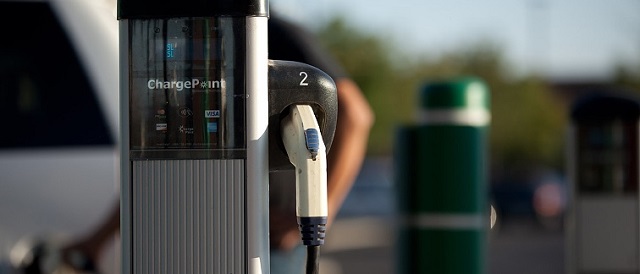
 Automotive1 day ago
Automotive1 day agoBiden’s Climate Agenda Is Running Headfirst Into A Wall Of His Own Making
-

 Economy1 day ago
Economy1 day agoFeds spend $3 million to fly 182 politicians and bureaucrats to climate conference
-
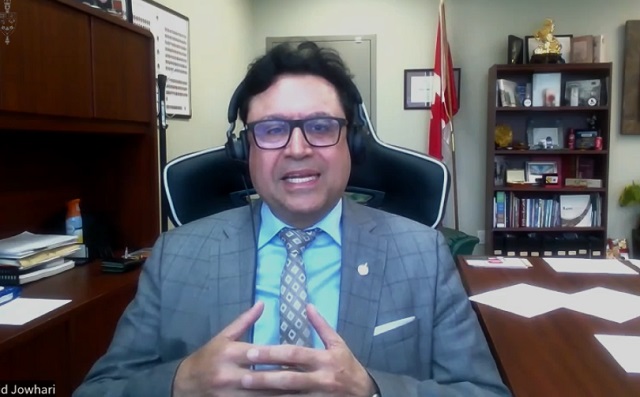
 Addictions14 hours ago
Addictions14 hours agoLiberals shut down motion to disclose pharma payments for Trudeau’s ‘safe supply’ drug program
-
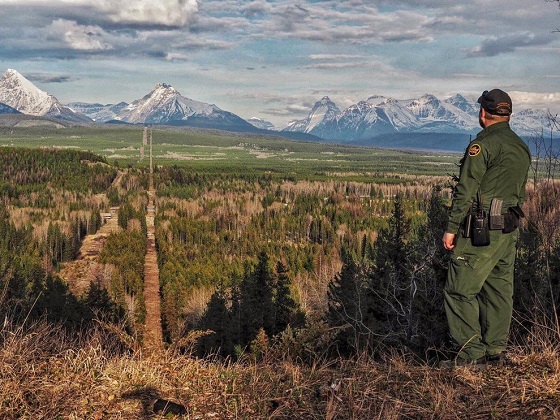
 Crime2 days ago
Crime2 days agoThe US Canadian border: Greatest number of terrorist watch list individuals being apprehended at northern border
-

 Energy5 hours ago
Energy5 hours agoTech giants’ self-made AI energy crisis
-
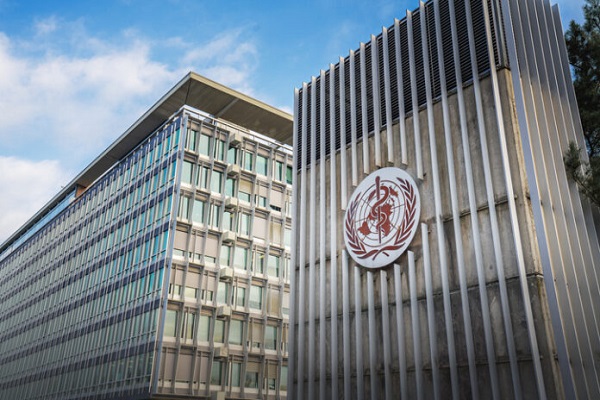
 Great Reset1 day ago
Great Reset1 day agoBiden Administration Eager to Sign WHO Pandemic Treaty
-

 Economy1 day ago
Economy1 day agoCanadians experiencing second-longest and third steepest decline in living standards in last 40 years



